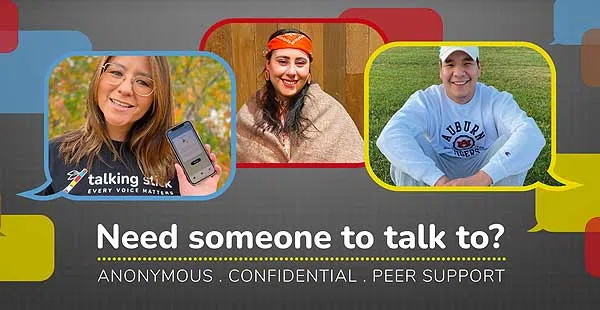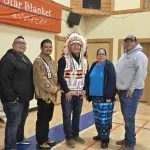
Talking Stick can be a lifesaver
Accessing safe and confidential mental health supports for Indigenous youth is just one click away thanks to Talking Stick.
It is an online chat platform created by TryCycle Data Systems (TDS), which is a Canadian digital health solutions company.
“We found there weren’t enough culturally sensitive mental health supports specifically for Indigenous people here in Saskatchewan,” said Robert Gladue, Talking Stick southwest regional manager, and member of Waterhen Lake First Nation. “Support that understands our background, our community, and our family dynamics.”
The creation of Talking Stick means Indigenous youth can connect anonymously to culture-based support workers via the chat application.
“That’s what is unique about Talking Stick – it’s run by Indigenous people for Indigenous people,” he said. “It’s supported by our peer advocates who are from First Nations communities across the province.”
The app has been around for about a year and the free service allows young people to quickly access Talking Stick’s network of peer advocates. There is no login or registration process, so the communication is completely anonymous, and the chat history is deleted after the conversation is over.
“Our guests can speak freely about whatever they feel they need to get off their chest and mind,” said Gladue. “And they can do it in a completely safe environment that is one-to-one.”
The ‘peer advocates’ chatting with the youth are vetted and chosen based on their supportive hearts and minds, said Gladue.
It’s not meant to take the place of any other mental health supports already in place, but simply add additional support in a setting that doesn’t feel formal in a client-to-clinician relationship, he explains.
According to the post-chat surveys, the most common topics include ‘anxiety, stress, and depression’, ‘family violence’, and ‘alcohol and drug abuse’.
The chats go on for as long as the youth desire.
The app is funded through Indigenous Services Canada and the Federation of Sovereign Indigenous Nations (FSIN), the later of whom wanted a communication service to help young people, said Gladue.
“We’ve had feedback from users, and it’s very positive,” said Gladue. “You can see that Talking Stick is making an impact at both the community and family level.”
The focus now is to get the information out to the public about the free mental health service.
Jennifer Fobert, Principal at Chamakese Education Centre at Chitek Lake, said a lot of young people struggle with having someone to support them, and sometimes don’t feel safe expressing their issues. This app helps to solve that, she said.
“We’ve had some suicides, and some attempts,” said Fobert. “There’s some mental health issues, and some kids have no one at home to talk to. Some kids will talk to us, but some won’t. I feel like sometimes they are afraid if someone at home finds out, they’re going to be in trouble.”
The anonymity has been a big factor for students being able to speak freely to the online peer advocates, she said.
Overall, she sees all the potential benefits of Talking Stick for her students.
“I think this could help them perform better in the classroom,” said Fobert. “When students engage with therapists, you can see the impact overall, in their academics and even in their personality. You can’t always reach every student, so this app makes it accessible to get help whenever they need.”

